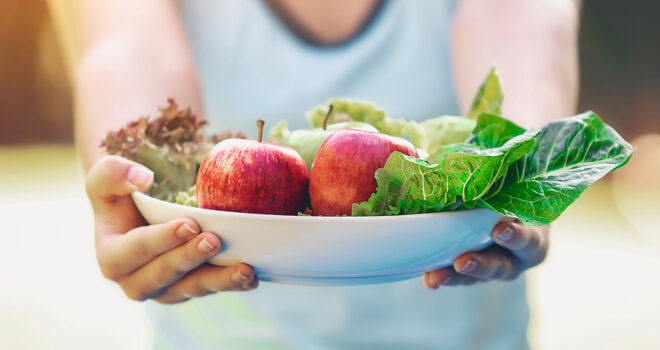The FAO has designated 2021 as the International Year of Fruits and Vegetables, underlining once more the importance of this group of foods for a better world. The Foundation is launching a new call for project proposals aimed at promoting the accessibility of plant-based food.
The Food and Agriculture Organization (FAO) aims to achieve food security for all and make sure that people in all countries have regular access to enough high-quality food to lead healthy lives. Eating fruit and vegetables is undeniably a key element for a healthy, balanced and sustainable diet. The FAO’s decision to designate 2021 as the Year of Fruits and Vegetables can therefore act as a springboard towards achieving the Sustainable Development Goals (SDG) by 2030.
Read also : Legumes and vegetables: what is the difference?
Lines of action around fruits and vegetables
The United Nations (UN) believes the International Year of Fruits and Vegetables offers a unique opportunity to raise awareness on the important role of fruits and vegetables in human nutrition, food security and health, as well as in achieving the UN Sustainable Development Goals. The lines of action focus on:
- Advocacy and awareness raising on the role of fruits and vegetables, not only for health and nutrition, but also their importance for society, the economy and the environment, and their contribution to sustainable development.
- Knowledge creation and dissemination, in particular to improve understanding of how fruit and vegetable food systems contribute to society, the economy and environmental sustainability.
- Policy-making that is favourable to fruit and vegetables in our societies.
- Capacity development and education, for example by supporting educational programmes, and enhancing the integration of nutrition education.
Read also: How to switch to a sustainable diet
What are the benefits of fruits and vegetables?
In its background paper1, the FAO underlines that fruit and vegetables have positive effects at all ages. In particular, they :
- help children to grow;
- support body functions and physical, mental and social well-being at all ages;
- can help to prevent all forms of malnutrition: undernutrition, micronutrient deficiency, overweight and obesity;
- can help to reduce the risk of non-communicable diseases.
The WHO recommends consuming at least 400 g of fruit and vegetables a day, or five servings of 80 g each. However, the 400 g daily target is rarely met: on a global scale, the average intake is estimated at 2/3 of the minimum recommended quantity. Information is not enough, action is needed!
Projects to boost plant-based food
For more than 15 years, the Louis Bonduelle Foundation has been supporting initiatives to bring about a lasting change in eating habits, in particular by promoting the role of fruit and vegetables in our diet. This year, the Foundation has joined forces with Ulule, the participatory incubator for new consumer trends, new uses and creative methods with a positive impact, to support and implement projects imagined and carried out by all!
Specifically, the aim is to organise a series of four calls for original project proposals in Europe and America, in order to encourage and support local players who promote access to plant-based foods and who are actively involved in the food transition.



 Bean sprouts
Bean sprouts  Celery
Celery  Vegetable garden: sweet potato
Vegetable garden: sweet potato 









